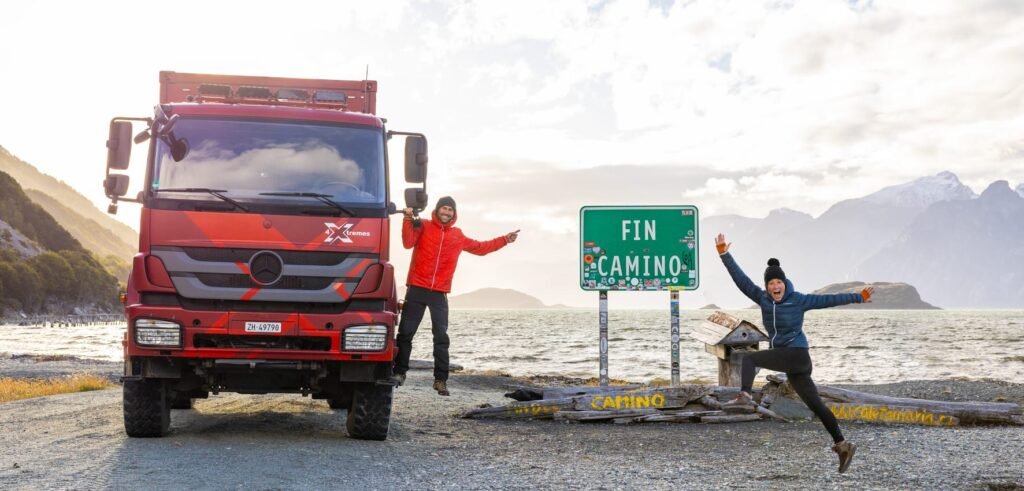Quitting your job, packing up your home, and moving full-time into a vehicle might seem extreme to some – but for Mike and Andrea, it was a practical step towards greater freedom and flexibility. What began with three years in a Land Rover Defender evolved into a long-term lifestyle centred on overlanding off-grid, spanning multiple continents and redefining how they live, work, and raise their family.
For the past seven years, this Swiss couple has lived in a converted 8-metre Mercedes 4×4 truck, travelling through remote regions and waking up in places far from the reach of traditional infrastructure. With no fixed address or backup accommodation, they’ve committed fully to off-grid living – generating their own power, managing their water supply, and raising their young daughter on the road.
The transition wasn’t straightforward. Downsizing, handling logistics, and navigating unclear regulations took time and patience. But in exchange, they’ve built a lifestyle that prioritises independence, self-reliance, and simplicity.
This is what overlanding in an off-grid vehicle looks like in practice – from the vehicle and systems they rely on, to the decisions that keep them moving.
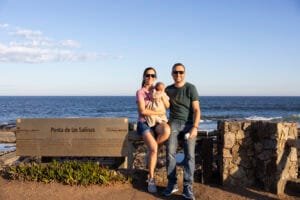
Beginning Life on the Move
Mike and Andrea didn’t set out to live on the road full-time. Their journey started with a shared love for travel and exploring natural, less-travelled places. “We love to stroll through small towns and meet new people,” Mike explains. “But more than that, we love to explore places untouched by man (as much as that’s possible nowadays) and experience the raw nature.” That interest in remote areas laid the groundwork for a mobile lifestyle. It also meant making some tough choices – leaving behind stable careers, daily routines, and the comfort of a permanent home.
“It sounds easy to get rid of stuff and downsize,” Andrea admits. “But there are so many decisions to be made, what to keep, what to do with things you’re emotionally attached to but don’t have space for, what to sell, give away or throw out.”
On top of this, there were administrative challenges. Swiss systems weren’t designed with mobile citizens in mind, making tasks like de-registering or dealing with tax and insurance more complicated than expected. “Sometimes even the officials couldn’t give us a straight answer,” she recalls. “The system is not designed for our type of lifestyle. But with persistence, it’s possible.”
After months of planning, saving, and gradually letting go of their old life, they hit the road. Since then, travel has become their normal – shaped by practical decisions, adaptability, and a strong commitment to staying mobile and off-grid.
Adapting for Long-Term Travel
Mike and Andrea’s off-grid lifestyle started with a Land Rover Defender 110, which they lived in for three years. This basic set-up taught them the basics of mobile living in a tight space. But over time, the limitations became more obvious – especially across changing climates and long-term travel. “We learned that to be comfortable in all types of climates and long term, we wanted a bigger home on wheels,” Mike says.
They upgraded to an 8-metre 4×4 Mercedes Axor truck, fitted with a 10-square-metre container on the back. It’s compact by most standards, but perfectly suited to full-time travel. “It sounds bigger than it is,” Andrea notes, “but we have everything we need.” The truck includes all the essentials: sleeping space, kitchen, storage, water systems, and off-grid power. Every part of the interior has been planned to maximise function and minimise waste. For Mike and Andrea, the vehicle isn’t just transport—it’s their home, workplace, and their daughter’s space to grow.
This shift wasn’t about luxury. It was about designing an off-grid, mobile home that could support long-term overlanding. The Defender had taken them far, but it lacked the space and systems needed for full-time comfort and independence. The Mercedes does what the old vehicle couldn’t – handle varied terrain, climates, and power needs without regular stops or outside support.
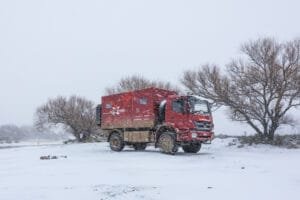
Off-Grid Systems
Living off-grid on the road means handling energy, heating, and water without relying on campsites or hookups. Mike and Andrea have designed their setup with this in mind. Solar panels are their primary power source, charging a battery bank that runs everything from cooking to lighting and hot water. “We mainly rely on batteries – for cooking, baking, hot water, etc.,” Andrea explains. “We can also charge off the truck’s alternator when we’re driving.” Plugging into external power is an option, but one they rarely need.
Heating is managed by a diesel-powered system, which keeps the truck warm without drawing power. It’s simple, reliable, and suits their need for independence across different climates. Water use is tightly controlled. With a limited supply onboard, they’ve learned to monitor usage closely and avoid waste. “You do learn to appreciate resources more! Especially water,” Andrea says. “Having a limited amount of water and power makes you really conscious about how much you use.”
This resource-awareness isn’t just a practical habit – it’s a core part of their lifestyle. Managing water, energy, and space every day has helped them stay grounded, efficient, and prepared for the demands of off-grid travel.
Daily Life in an Overlanding Off-Grid Truck
Life on the road doesn’t follow a fixed schedule. For Mike and Andrea, routines shift depending on weather, location, and mood. The one constant is flexibility. “No day is the same as the last one,” Andrea says. Still, there’s a loose rhythm that helps structure their time. Most mornings begin with the sunrise, a coffee, and some quiet time together as a family. It’s a chance to connect and decide what the day might hold.
“If it means that we’re driving somewhere new, we like to leave early-ish,” she adds, “but again, this depends on the day.” One thing they avoid is travelling at night. Instead, they aim to reach their next location early enough to settle in and explore the area in daylight. The beauty of overlanding is that plans can change at any moment – and often do. “We often make plans and then end up doing something very different,” Andrea says. “For example, we might plan to drive to spot X for lunch and spot Y to camp. But if spot X turns out to be super nice, we just stay there.”
This spontaneous way of living suits their mobile setup. It gives them the freedom to follow good weather, avoid crowds, or simply stop when a place feels right. Rather than trying to fit their lives into strict routines, they’ve created a way of living that adapts to their needs day by day.
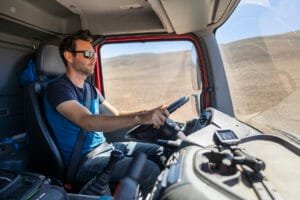
The Rewards and Realities of Off-Grid Life
Living on the road, entirely off-grid, comes with its share of trade-offs. For Mike and Andrea, the biggest reward is simple: time. Time to rest when it rains, to slow down and enjoy mornings with their daughter, or to linger in a remote location with no pressure to leave. “The most rewarding part about off-grid living for us is to have time,” Andrea says. “Time to cuddle our baby daughter, to enjoy a day in the middle of nowhere with no commitments, time to stay in the most beautiful regions of the world for as long as we like – until our food, water or visa runs out.”
That freedom is hard-won. It requires planning, resourcefulness, and a willingness to live without many of the comforts and conveniences that most people rely on. But for this family, those sacrifices are part of what makes the lifestyle meaningful. There are, of course, real challenges. The biggest one is distance from loved ones. “The most challenging would be not spending quality time with family and friends,” Andrea says. “Of course we can talk to them every day, but spending time together is limited to a few weeks a year – at best.” Connectivity helps, but it doesn’t replace physical presence. And while technology makes it easier to keep in touch, it can’t bridge the miles between continents or replace shared meals and face-to-face conversation.
Still, for Mike and Andrea, the balance is worth it. They’re raising their child surrounded by nature, not screens. Their daily choices are driven by weather patterns, local terrain, and personal instinct – not work schedules or rent payments. It’s a life that’s full of small freedoms, made possible by their commitment to overlanding off-grid and living in tune with the world around them.
Lessons from the Road
After years of overlanding off-grid, Mike and Andrea say one of the biggest shifts has been in how they see the world – and how they understand their place in it. Long-term travel has broadened their perspective far beyond national borders and familiar routines. “It has opened our way of thinking,” Mike explains. “The world gets smaller the longer you travel. Once you have been on the road for a while, you start to connect the countries in a different way. Understanding cultures better, accepting more diversity in terms of ways of life and thinking – making it harder every time to go ‘home’.”
Experiencing different ways of living up close has challenged old assumptions and brought new clarity about what really matters. It’s also strengthened their belief that off-grid living doesn’t look one particular way. There is no single route or ideal setup – it all depends on what works for you.
When asked what advice they’d give to others thinking about living this way, Andrea is clear: “Just do it! Start with what you have and take it from there. There will always be something to improve, but the most important thing is to find the right vehicle, tiny home, boat – whatever fits your, and only your, needs and lifestyle!”
It’s a reminder that you don’t need the perfect build or a detailed five-year plan to begin. Whether you start with weekend trips or a basic van conversion, the key is to get moving and learn along the way. The rest will follow.
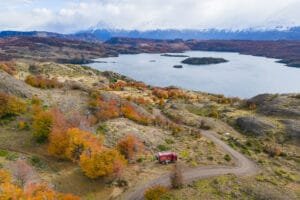
Community, Connection, and the Future
While overlanding in an off-grid vehicle often means travelling through remote places, Mike and Andrea have found connection in a global community of people living similar lives. Whether on the road or online, they’ve built relationships with fellow travellers, off-gridders, and digital nomads who understand the lifestyle firsthand.
“We connect more to people living off-grid or travelling, since we are living that lifestyle ourselves,” Andrea explains. “It’s great to connect with people around the globe and even meet them eventually when the paths cross – which is harder than it might sound. The exchange is mainly on Instagram or Facebook.” These digital networks help them stay connected, share experiences, and exchange practical advice – from route planning to truck maintenance. It’s a form of community that is both decentralised and strong, built on shared values rather than location.
Looking ahead, their journey is far from over. “We would definitely love to keep exploring the world with our home on wheels,” Mike says. “We’d like to see more of Asia and Africa. Those would be our next destinations, but first we plan to finish exploring South America for the next two years. After that… who knows.”
Their plans remain flexible, shaped by opportunity and instinct rather than rigid timelines. For a couple committed to the freedom of mobile, off-grid life, staying open to the unexpected is part of what makes the lifestyle so rewarding. They may not know exactly where the road will lead – but that’s precisely the point.
Final Reflections
Mike and Andrea’s lifestyle is built around practical choices, not romantic ideals. Through their off-grid, overlanding set-up they’ve created a way of life that gives them time, flexibility, and a strong sense of self-sufficiency – while accepting the trade-offs that come with it.
Their home on wheels allows them to travel at their own pace, stay in wild places, and raise their daughter in close connection with nature. It also requires constant planning, a realistic mindset, and a willingness to adapt. They’ve shown that you don’t need to wait for the perfect moment or setup to get started. As Andrea puts it: “Start with what you have and take it from there.” Over time, systems can evolve. The important thing is to build a lifestyle that suits your needs – not anyone else’s.
For those curious about life on the move, their experience offers a clear message: off-grid living in an overlanding vehicle is possible with careful preparation and the right mindset. It may not be for everyone – but for those it does suit, it offers a rare kind of freedom that’s hard to find elsewhere.
To follow Mike and Andrea’s journey you can visit their website or find them on Instagram and Youtube.
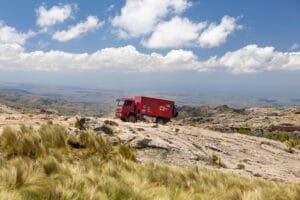
If you found this article interesting, you might also enjoy this one, about how an English couple Jess and Dan adapted to life in their off-grid house truck.


